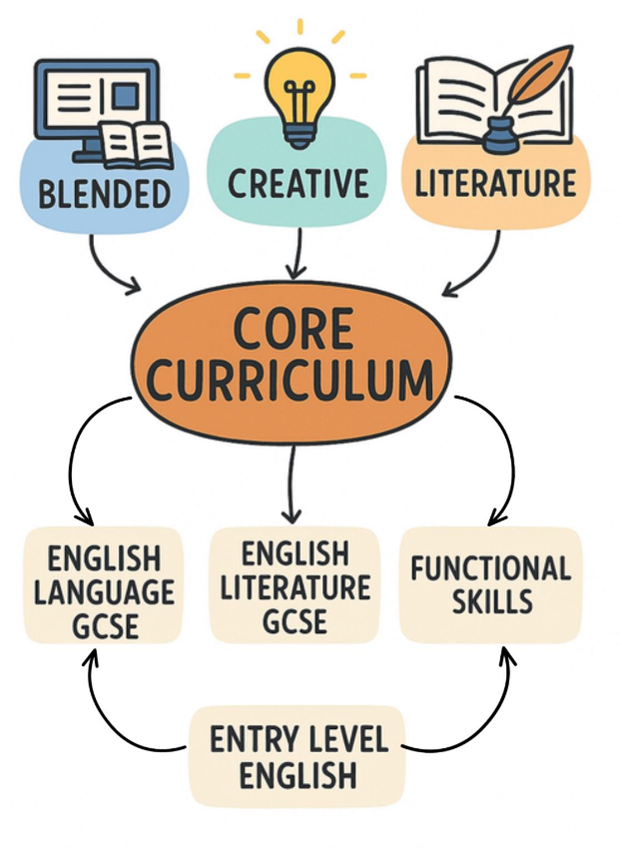

English
We are committed to equipping every pupil with essential skills in speaking and listening, reading, and writing, in line with the National Curriculum.
We have designed a bespoke curriculum that is carefully tailored to meet the individual needs of each student, ensuring they are supported, challenged, and inspired to reach their full potential.

Our curriculum is entirely bespoke—built without textbooks and crafted instead from resources designed in-house to meet the specific needs and interests of our pupils.
Grounded in the latest pedagogical research, it is shaped around the concept of ‘vehicles of learning’—where core objectives and outcomes are taught through engaging and often unconventional contexts designed to spark curiosity and motivation.
This innovative approach has seen creative writing taught through computer games, narrative perspective explored via car chases, and descriptive language brought to life through The A-Team.
As pupils progress through the school, this highly creative curriculum gradually transitions into a more traditional structure by Key Stage 4, ensuring full alignment with exam requirements while retaining the engagement and depth of earlier learning.
For students whose reading progress causes concern, we offer targeted one-to-one support to help close any gaps. All pupils are assessed upon entry to the school, and we use the Lexonik Reading Programme to inform a structured, three-tiered intervention approach: LEAP, FLEX, and our in-house ‘Watch List’—a monitoring system that allows us to provide timely support to pupils who may need it.
In addition, all subject teachers are trained in active reading strategies, enabling pupils to break down complex texts into manageable chunks—a vital skill for reducing cognitive overload.
Our Curriculum Model

We know that every learner is different — so we provide multiple, carefully structured pathways that enable all students to access the core curriculum in a way that works for them.
Our curriculum model is built on three key access routes:
- Blended – our programme for pupils who are not currently in full-time, on-site education. This approach combines remote learning, one-to-one support, and personalised resources to ensure these learners remain fully included in the curriculum.
- Creative – a more flexible, less traditional route that uses imaginative and alternative strategies to engage pupils. We meet students where they are — using storytelling, games, visual media, or real-life contexts to build confidence and develop their knowledge and skills within English. This often leads to Entry Level English and then to GCSE English.
- Literature – a central strand offered to all pupils, giving them access to high-quality texts that match the challenge and depth of their peers. This ensures our learners are not only included but stretched and inspired by the same rich material.
Key Stage 3 English (Years 7–9)
In Key Stage 3, pupils engage with a broad and diverse range of literature and writing styles. Each year, they study at least one extended class reader and explore a variety of texts including Shakespearean extracts, short stories, films, war poetry, and a wide selection of non-fiction.
Our curriculum is built around three core pillars: reading, writing, and thinking—with a strong emphasis on the idea that pupils retain what they actively think about. By the end of Year 9, many students begin working towards external accreditation through Functional Skills English Level 1, laying a strong foundation for Key Stage 4.
Key Stage 4 English (Years 10–11)
At Key Stage 4, pupils continue with Functional Skills English, with some taking assessments multiple times across Years 10 and 11 to ensure progress and confidence.
The core focus is on GCSE English Language and GCSE English Literature. For Literature, we study a powerful and culturally rich selection of texts, including:
- Macbeth
- Lord of the Flies
- A Christmas Carol
- The Power and Conflict poetry anthology
We find that pupils engage deeply with the knowledge, themes, and historical contexts embedded in these works. To support learning and reduce cognitive overload, we make regular use of mnemonics and active recall strategies tailored to individual needs.
Qualification route/s – Entry Level, Functional Skills Levels 1 & 2, GCSE English Language and GCSE English Literature.
English and our six core values
Our English curriculum is built on a set of core values that not only promote academic success but also support the personal growth of our pupils. Designed with the needs of SEMH learners in mind, our approach is flexible, inclusive, and ambitious — ensuring all students engage meaningfully with English and leave with skills that extend far beyond the classroom.
Balance
We aim to provide a rich and balanced English curriculum that engages and stretches our students in equal measure.
- Key skills — speaking, reading, and writing — are interwoven within lessons to ensure depth and variety.
- Pupils experience a wide range of texts, from contemporary literature to canonical works such as Hamlet and A Christmas Carol, giving them vital exposure to Cultural Capital.
- With over sixteen Schemes of Work each year, we ensure that our curriculum remains fresh, varied, and stimulating — helping to maintain engagement and momentum.
Communication
At its core, English is about communication — and this remains central to everything we do:
- Pupils develop written communication skills with an emphasis on clarity, structure, and purpose.
- We encourage spoken communication in full sentences and in Standard English, preparing pupils for real-world interactions.
- Students learn to interpret and respond to a writer’s intended meaning — developing empathy, awareness, and critical thinking.
Going Beyond Your Borders
Through carefully chosen texts, we help pupils expand their understanding of the world and challenge their existing perspectives:
- Our literature choices go beyond the familiar, exposing students to cultures, lives, and experiences they may never have encountered.
- While we value texts that reflect students' lives, we also deliberately select works that broaden horizons and promote intellectual and emotional growth.
- Books, plays, poetry, and discussion activities are used to encourage students to transcend their immediate environment and explore the wider world.
Resilience
English builds resilience — not only through preparing for external qualifications like Entry Level Functional Skills and GCSEs, but also through daily reading and writing challenges.
- Pupils develop academic resilience by engaging with demanding texts from both our literary heritage (e.g. Shakespeare, Chaucer) and global cultures.
- Regular low-stakes challenges help build the stamina, focus, and grit needed to persevere with extended tasks and unfamiliar materials.
Reflection
Reflection is at the heart of great English learning:
- Pupils are taught to reflect on their own work, exploring the impact of their word choices and writing decisions.
- Literature is used as a tool for deeper emotional and intellectual reflection — encouraging students to engage with characters, themes, and dilemmas they might not otherwise encounter.
- Every class reads a novel each year, as fiction uniquely nurtures empathy, perspective-taking, and emotional literacy — especially important for our cohort and those needing support with reflective thinking.
Independence
Developing independent learners is central to our approach, especially in preparation for assessments and life beyond school.
- By Year 9, we have moved away from writing frames and instead use mnemonics and ‘thought stems’ — tools that guide thinking while promoting independence.
- We promote independence of writing through laptops and text to speech. It is important to us that all our students have access to independent writing.
- We actively encourage students to take ownership of their ideas, responses, and revision strategies, helping them build confidence in expressing themselves both verbally and in writing.

